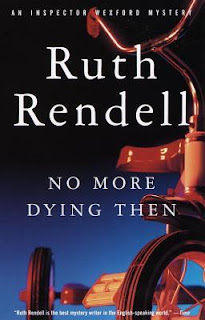No More Dying Then (1971) by Ruth Rendell
Nine months ago Stella Rivers, twelve years old, disappeared when walking home from riding lessons. Inspector Reg Wexford and the Kingsmarkham police did everything in their power to find her, but there was no trace. Now a five year old boy, John Lawrence, has gone missing after walking away from the neighborhood park. This time letters start arriving--saying that the kidnapper only wanted to keep John for a while and--if the police keep out of it--he will be sent safely home. But when Mike Burden, recently returned from compassionate leave after the death of his wife, discovers Stella's body in the well of an abandoned house, they fear that little John Lawrence may never come home. If the same person is responsible for the disappearance of both children, then it is a race against time that Wexford can't afford to lose.
I actually finished this a couple days ago. I haven't been exactly sure what I want to say about the book. My reading tastes have changed a bit since my teens--not in all ways, but I'd say my affinity for Ruth Rendell is one of them. Back then I read everything of hers our local library had because I couldn't get enough of her. And kept picking up her newer ones into my twenties. In recent years I've revisited some of her books and have been disappointed to find that they just don't hold me the way they did back then. I couldn't even finish A Judgment in Stone though I still realize what an important book it was.
No More Dying Then was better, though the child endangerment trope hits me harder now than it did before I had a son. The mystery plot itself was intriguing and the motive for the murder was an interesting one and led to a satisfying, surprising ending. But I have to say that Mike Burden got on my nerves here. He's supposedly grieving for his wife (and, yes, he does think about some sweet moments with her)--but it seems to me that what he's really missing is sex. Until about midway or so in the book he's been too prudish to seek relief outside of the marriage bed--which turns him into a snarly, distracted colleague for Wexford. It's amazing how his late-book fling turns things around for him (not that Burden is ever an extraordinarily cheerful kind of guy). And the way he treats his sister-in-law and children--well, he ought to be ashamed. He is a bit at the end, so there's that. [Though I still get the sense that he's very self-absorbed.]
Good mystery. Less focus on Burden would have made it better. ★★★
First line: The spell of fine weather which so often comes in the middle of October is known as St. Luke's Little Summer.
Last line: She leaned towards him, her face serious and intent. "Let's talk," she said.
******************
Deaths = 2 (one strangled; one drowned)






























2 comments:
Bev - I’ve also been disappointed by the ’60s and ’70s Rendells; are they too much of their time? Too grim? Like you, A Judgement in Stone disappointed me when I reread it; I could finish it, though. Rendell really hits her stride from 1980, I think.
Nick, I'm not entirely sure why some of these disappoint so much now. It may be that when I was reading them when I was younger that I was much more focused on the mystery plot and less on the interpersonal relationships.
Post a Comment